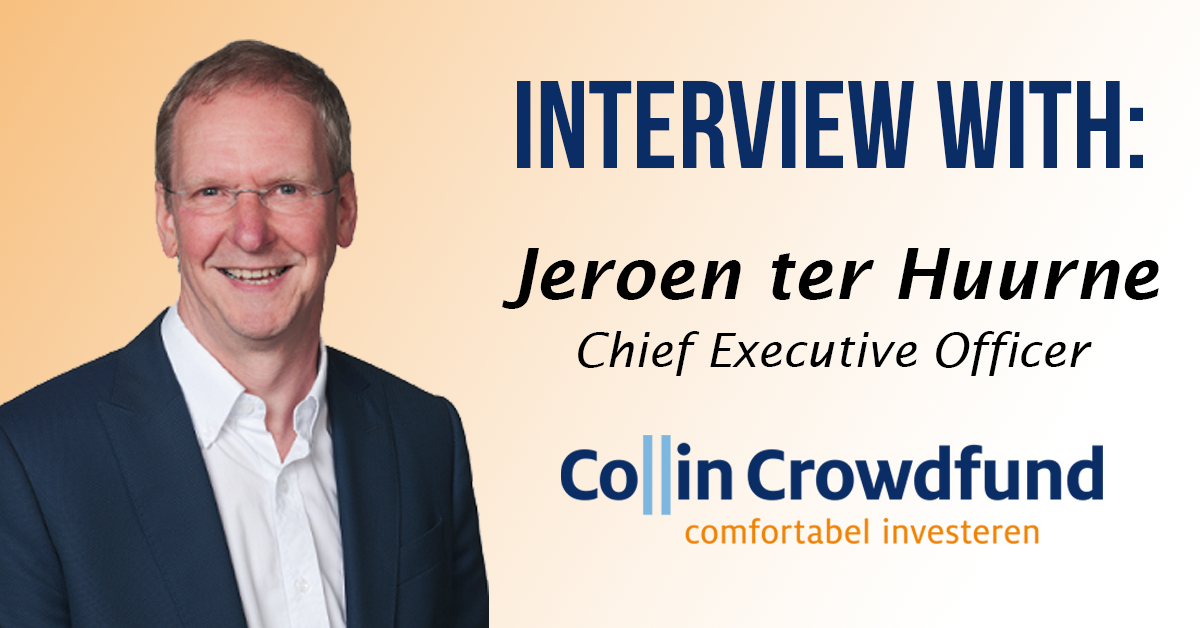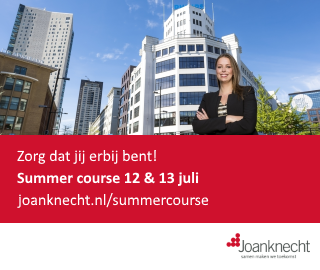Can you tell us something about yourself?
My name is Jeroen ter Huurne, I was born and raised in Nijmegen. At the age of 29, after finishing the heao, I became the youngest Rabobankmanager of the south of the Netherlands. I have worked here for 30 years, 22 years in a management position in both small and national offices. Later on, I followed a master in Business Administration at Nyenrode and I did some masters in London and Shanghai. Due to the crisis, banks became more and more careful and more supervised. When I saw chances in the market of crowdfunding and finance, the combination of carefulness and my growing ambition to start my own company made me establish Collin Crowdfund.
What created your ambition to become an entrepreneur?
This ambition grew due to my father. He raised me with this ambition. In the beginning of my time at Rabobank, I had the opportunities to let this ambition grow, because banks where smaller and more autonomic then. Nowadays these banks became bigger, whereupon the autonomy decreased.
How much competition is there for Collin Crowdfund?
In the Netherlands, there are around 100 crowdfund-organisations. Most of them are busy with charities and donations, which is different from what we do. This is the reason why I prefer to call our branch ‘crowdfinance’. We, and around 50 other organisations, are busy with financing midsized firms. From those 50, 10 are worthy to see as competition. Since 1.5 years, Collin Crowdfund leads the market!
The crowdfund-part within mid-sized firms is only a small, but fast-growing segment. Our loans double each year. What is important is that we co-finance the firms, for example with a bank.
I expect that the market of crowdfinance will keep doubling itself in the upcoming years. In England, crowdfinance has grown already. The crowdfinance-market is worth billions there.
Is it true that the AFM has special rules for crowdfinance/fund companies?
Yes, that is certainly true. The AFM gives us an exemption to operate in the market. This requires that we meet requirements, which they sharpen every year. I think this is a good job, because only in this way you can offer the needed protection towards the investors and lenders. I think the world of accountancy has something else to say about this, they think the AFMs rules are too strict. I became president of the branch organisation “Nederland Crowdfunding” a while ago, to take part in guaranteeing protection on the market. This means that I have an active role in fortify the transparency and self-regulation. In this way, we support the market and our colleagues/competitors to let the market grow as one entity.
“By supporting others, we let the whole entity grow instead of just focusing on our market share.”
Do you think it is dangerous to help other crowdfund organisations grow?
Good question! From a competition perspective, you would think that you should not help others. I think this is only dangerous in a grown market. However, the young upcoming market of crowdfunding is still limited. By supporting others, we let the whole entity grow instead of just focusing on our market share. Furthermore, we also receive damage if others make mistakes. The market will decrease then.
What is the difference between banking and crowdfund?
We are mediators between lenders and investors. Banks lend money out themselves; we do not do that. Recently we reached our total loan amount of 100 million euros. This money went from the investors, via us, to the lenders. It is not our money though. A large amount of investors has chosen to give this money to the lenders themselves. We review requests and publish them. Furthermore, we take care of the administrational and financial process.
At a bank, you receive interest on your savings. The bank decides were to invest the money, without any of your influence. With crowdfunding, this is different. Your interest is linked 1 to 1 to the company you invest in. We receive a fee from investors and lenders. It is still hard to compare banks and crowdfunding, because you will have no risks by saving your money on a bank. You will have risks when investing the money, but you will also have a higher return. The average investor will receive 4% on his investments.
Are you afraid that investors will stop thinking about where to invest in themselves, because they have trust in your selection of companies?
This question is not easy for me to answer. I think the average investor has a hard job in calculating the solvency of a company. This does not mean I underestimate our crowd; they will always have the last word. We even advise them to read companies’ pitches carefully. Despite, we give them some recommendations. Indeed, we have a lot of knowledge. Reviewing a company is a job on itself. Our Crowdfund Coaches have a lot of expertise, which makes that investors have trust in them.
“Sometimes we see that investors send money 1 minute after publication of a pitch. We know that they have not read the pitch carefully. Do we think they are doing a bad job? No.”
Sometimes we see that investors send money 1 minute after publication of a pitch. We know that they have not read the pitch carefully. Do we think they are doing a bad job? No. If you invest 500 euros in each request, your spread is perfect. We expect your return will be around 4% then.
We think it is important that investors have a good look on what they invest. A higher return often leads to a higher risk. That makes it important for us to publish only the loans where we believe in. Therefore, we reject two out of three serious requests we receive. This leads to a percentage of 99,4% of loans that will be funded after publication on our website.
Finally, what do you want to say to students?
What makes finance interesting is that you can have a look inside companies. What people usually see at one company is what we can see at hundreds. This makes it a great opportunity to learn. Something else I want to say is that you have to believe in yourself if you start your own business. Collin Crowdfund started 3.5 years ago in a rebuilt pavilion. 3.5 years later, we are the market leader with a big team. If it depends on us, we just started!

















